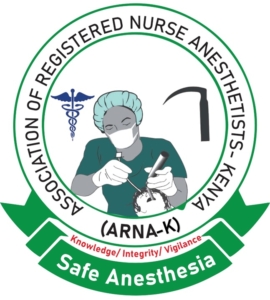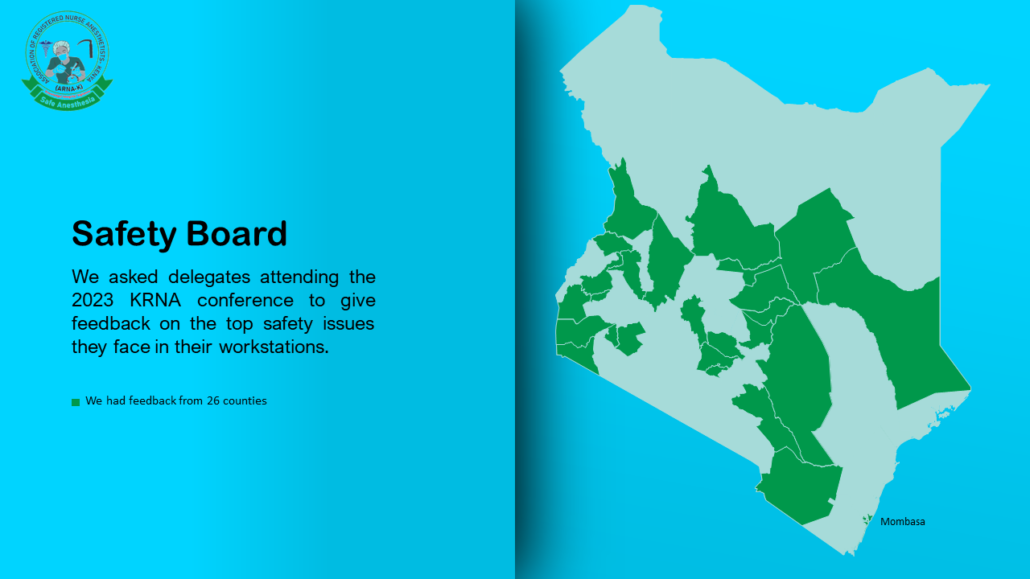Posts
The 10th Annual KRNA Conference: Advancing Quality Anesthesia for Nurse Anesthetists
/in Continuing Medical Education, News /by GatwiriDiscover the highlights of the monumental 10th Annual KRNA Conference hosted in Meru County, Kenya. As the inaugural conference organized by the recently established Association of Nurse Anesthetists-Kenya (ARNA-K), this event surpassed all expectations, setting a new benchmark for nurse anesthetists’ professional development in the country
.Over three days, we welcomed a record-breaking attendance of more than 129 participants, with nurse anesthetists comprising an impressive 71% of the delegates. Joining them were anesthesia assistants, anesthesiologists, and perioperative nurses, contributing to a diverse and vibrant gathering. In addition to the Kenyans from 34 counties, the event welcomed international delegates from Zambia, South Sudan, and Tanzania. The conference revolved around the central theme of quality anesthesia, with a focus on patient safety. Attendees engaged in a comprehensive program consisting of enlightening lectures, interactive workshops, and thought-provoking panel discussions, all geared towards enhancing their knowledge and refining their practice.
“Very
good presentations from knowledgeable and wise speakers”
WORLD ANESTHETISTS DAY 2020
/2 Comments/in KRNA updates, News, What we do /by KRNAOne of the KRNA chapter responsibilities is to advocate for the welfare of its members. Comprised of license nurse anesthetists and associate student nurse anesthetists member, the KRNA chapter is registered under the National Nurses Association of Kenya. Between April and September 2020, the chapter collected data from its members. A Google form was created and sent to 200 known KRNAs practicing in Kenya. One hundred and ten (55%) of them responded representing 47% of the total number of the KRNAs trained in Kenya. Only 3% of the KRNAs remain unemployed. Among the unemployed are KRNA trainees who while have successfully completed their training, are yet to sit for the licensing exam postponed due to the COVID-19 pandemic.
While more than 70% indicated that they were either neutral or satisfied with their work, a significant percentage expressed dissatisfaction with their remuneration. Some concerns that have been raised that affect job satisfaction include workload, equipment, and supplies. While an ideal situation is to have at least 3 anesthetists per surgical bed to provide 24-hour coverage, many non-physician anesthetists work in under-resourced facilities with only one anesthetist per surgical bed leading to a huge workload. Kenya in general has a limited anesthesia workforce and the situation is more severe outside the capital city of Nairobi, where more than 80% of the anesthesiologists practice. Non-physician anesthetists working independently form the bulk of the anesthesia workforce for the underserved communities in Kenya.
Another major issue is limited equipment; even basic tools like laryngoscopes are not readily available in some facilities and many of the anesthetists are forced to buy their own sets in order to make sure they have one when they need one. Monitoring tools like pulse oximeters are also limited and some facilities have outdated versions of the anesthesia machines that lack standard monitoring like capnography and ECG leads. Supplies of drugs and disposables also remains a challenge. Shortages of pain management drugs like morphine, spinal needles of appropriate sizes and difficult airway equipment including those for pediatrics are a common occurrence.
With regard to remuneration, only 56% of the graduates have been redesignated as nurse anesthetists. This lack of formal recognition of their specialized training locks them out of promotion opportunities. They have also been locked out of fair recruitment process with only a few counties setting aside slots for recruitment of KRNAs when hiring additional anesthesia workforce. The KRNAs have also being locked out of certain allowances including the call allowances despite handing calls in their practice. These challenges have a direct impact on their fair remuneration commensurate to the work done.
Nurse anesthetists are competent and skilled, trained to provide safe anesthesia in all forms of surgery including obstetrics, pediatrics, orthopedic, neurological, plastics, and general surgery. They can administer all forms of anesthesia including general anesthesia with additional skills in pain management, resuscitation and critical care. The KRNA chapter has strived to ensure that their members have members to not only CME opportunities but also create forums for engagement and mentorship as well as explore options for higher level of training. As we celebrate the World Anesthesia Day, we look forward to a future where the role nurse anesthetists play in the delivery of safe anesthesia will be recognized. Our work in bridging the gaps in access to safe surgery is unquestionable and the chapter will continue to advocate for its members to ensure they are well compensated, well trained, and perform their work to the highest possible standard
KRNA
Kenya Registered Nurse Anesthetists
KRNA Calendar
| M | T | W | T | F | S | S |
|---|---|---|---|---|---|---|
| 1 | ||||||
| 2 | 3 | 4 | 5 | 6 | 7 | 8 |
| 9 | 10 | 11 | 12 | 13 | 14 | 15 |
| 16 | 17 | 18 | 19 | 20 | 21 | 22 |
| 23 | 24 | 25 | 26 | 27 | 28 | 29 |
| 30 | ||||||

